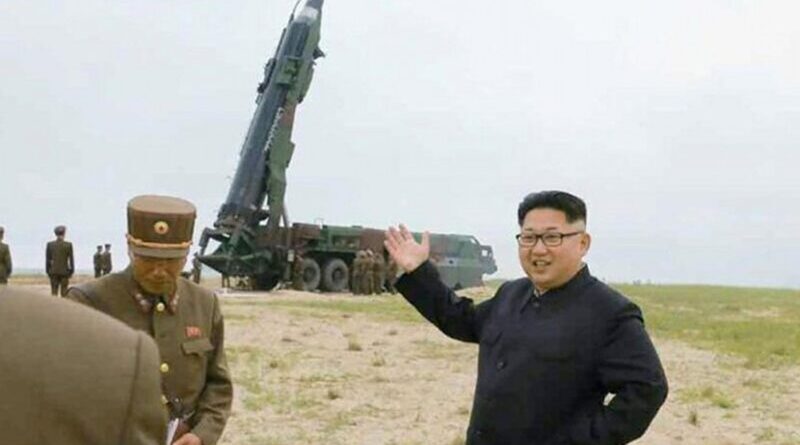North Korea Is Not A Serious Negotiator And Biden Will Act Accordingly – Analysis
By Arius M Derr*
The six summits between former US president Donald Trump, South Korean President Moon Jae-in and North Korean leader Kim Jong-un — in various combinations — failed to generate any lasting change on the Korean Peninsula. Foreign policy hawks and doves will draw different lessons from these events, but the case that Kim will not trade away North Korea’s nuclear weapons under any circumstance is likely to be more persuasive now, especially to centrists in the United States.
In South Korea, the dovish left and the coalition behind Moon will come away undaunted. They will likely make two claims against an interpretation of failure. First, they can claim, with some justification, that Trump was never serious about the process, so his failure with Kim does not invalidate the argument that countries should seek inter-Korean peace through big-bang, conditions-free summitry. The theory behind an apex summit assumes a serious, adept US counterpart in the negotiations — Trump was clearly not that.
In a second related claim, doves will pin the failure more broadly on the United States, arguing that its stubborn attachment to sanctions and the constraints of the US alliance on Seoul undercut Moon’s peace agenda. A unilateral South Korean outreach to the North would have jeopardised South Korea’s relations with the United States. Moon had no room to move independently to find other possible deals or arrangements.
Policymakers in Washington and many outside Moon’s government will draw a much more direct lesson, consistent with the long history of North Korean bargaining behaviour. The lesson is that Pyongyang is not genuinely interested in negotiating on core strategic issues like nuclear weapons.
North Korea had a rare bargaining opportunity, unique in the 75-year history of Korean division, and passed it up. Kim made no serious proposals to the Trump administration on the issue of nuclear warheads and missiles. His offer at the 2019 Hanoi summit of sanctions relief in exchange for the dismantlement of the Yongbyon nuclear complex was so obviously imbalanced against the United States that Trump, anxious for a deal, rejected it. What, when or how much of Yongbyon would be turned over was never defined, nor were North Korea’s other nuclear facilities apparently discussed.
Kim never seemed to grasp how desperately Trump craved media spectacle or that Trump would have settled for far less than his predecessors. Even perfunctory displays of progress, such as several North Korean transporter erector-launchers rolling across the demilitarised zone into the hands of South Korean and US forces, would have represented a fraction of North Korea’s arsenal but a huge ‘win’ for Trump in the media.
Kim had his best shot and passed it up. Instead of seeing Trump as a weak negotiator and easy mark, North Korea brought an unrealistic proposal to Hanoi on which it refused to budge and then gave US negotiators the cold shoulder throughout 2019–20.
The likely upshot will be a shift to the right in normatively acceptable policy rhetoric on North Korea, especially in the West. This coincides with the default policy preferences of the Biden administration and the US foreign policy establishment. The old playbook — containment, deterrence, sanctions and isolation — is the obvious fallback.
Biden has not shown any serious inclination to engage North Korea. He has already signalled a tougher, more traditional line, centred on the US–South Korea military alliance. A US–North Korea summit is unlikely given the wide strategic gaps between the two sides. Negotiations will be pushed back down to the bureaucracy and the morass of detail. Biden represents a return to form for Washington’s North Korea policy.
Further hawkish policy space will likely open as well. The failure of outreach will likely validate beliefs that North Korea will not negotiate its weapons under even the most generous diplomatic conditions. Options previously considered too extreme or risky may gain new visibility. The likely policy option is cutting North Korea off even further from the rest of the world to prevent its proliferation of nuclear and missile technologies, and to cut hard currency flows funding the lavish lifestyle of the Kim court.
Previous efforts to severely isolate North Korea were kept in check by the need to maintain good relations with China, the North’s benefactor. But with China–US relations in decline, there is less reason to hold back.
This fits Biden’s preference for both multilateralism and greater toughness on North Korea. If North Korea continues apace to build nuclear warheads and missiles, then there will be growing pressure to prevent the outflow of these technologies. This raises the possibility of provocations or even violence, a risk that the United States may be willing to run if there is no other way to halt proliferation.
*About the author: Arius M Derr is a PhD candidate in the Coral Bell School of Asia Pacific Affairs at the Australian National University.
Source: This article was published by East Asia Forum and is drawn from a paper co-authored with Robert E Kelly published here in the Korean Journal of Defense Analysis.

